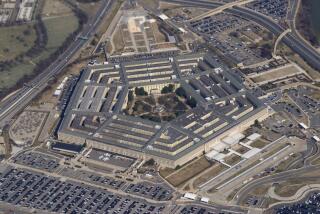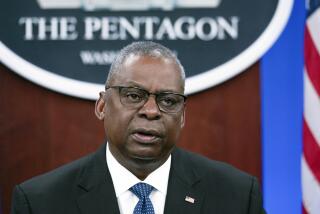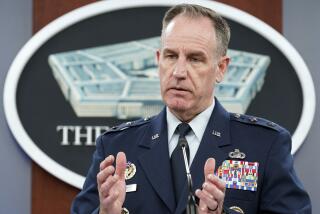Defense Dept. Probe of Kerrey’s Medal Is a Possibility
The Pentagon Thursday opened the possibility that it might investigate its award of a Bronze Star medal to former Sen. Bob Kerrey of Nebraska for a Vietnam War mission that cost the lives of at least 13 civilians.
Amid a widening debate over the February 1969 episode, Defense Department officials said an investigation could be launched if it appeared that a medal was awarded because of a false report on a service member’s action.
Yet defense officials said there has so far been no high-level interest in pursuing such an investigation. Privately, some officials acknowledged that the department would be reluctant to try to gather facts from decades ago that would be hard to corroborate and politically sensitive.
The issue arose this week after Kerrey, a leading presidential candidate in 1992, acknowledged that he has been secretly tormented by the memory of his actions in a nighttime sortie in the Mekong Delta.
A 25-year-old Navy Special Operations SEAL at the time, Kerrey led a squad into an isolated hamlet in an effort to shut down a Viet Cong meeting.
The Navy’s award citation said the attack led to the deaths of 21 Viet Cong, the burning of two Vietnamese thatched-hut dwellings, and the capture of two weapons. But the award, signed by Adm. Elmo R. Zumwalt, then-chief of U.S. naval forces in Vietnam, does not mention that many civilians died in the assault, as Kerrey and others involved now acknowledge.
One member of the team, Gerhard Klann, has given a more critical account to news organizations, claiming that the SEALs herded the villagers into a group and massacred them. Kerrey strongly disputes that account.
The incident at Thanh Phong in the province of Ben Tre came to light after Kerrey publicly discussed the raid, a disclosure apparently prompted by a joint investigation by the New York Times Magazine and CBS News’ “60 Minutes II.”
Rear Adm. Craig Quigley, the Pentagon’s chief spokesman, told reporters Thursday that “you could conceivably rescind the award” if an investigation established that it had been based on false information. Any investigation would have to determine whether the false report came about because of an honest mistake or “an intentional effort from the get-go to describe a situation that never occurred.”
The two cases would be “very different, and you’d have to ascertain which one you had,” he said.
At the same time, Quigley and other defense officials said they have seen no indication that Defense Secretary Donald H. Rumsfeld, Acting Navy Secretary Robert Pirie or others were interested in pursuing an investigation. Nor, officials said, have they heard calls for such a probe from anyone in Congress or organized veteran groups.
At a news conference in Manhattan, where he is president of the New School University, Kerrey said he had notified his military superiors that civilians died in the attack. They were told, he said, in an “operational” debriefing, rather than in a written report.
“Women and children were unquestionably mentioned in the debriefings that we provided,” Kerrey said. “We filed an operational report, not a written report. I don’t know that it says exactly women and children, but it was not a secret to our commanding officer what happened that night.”
Kerrey said the Viet Cong did fire on the squad and that they feared they were vulnerable to attack by the civilians.
Kerrey said he does not know what the officers wrote in the document that led to the medal.
“You’re going to have to talk to the person who writes and makes the decisions about the award,” he said. “I neither sought it nor did I write it.”
Kerrey denied the claim by Klann, a squad member, that SEAL commandos lined the villagers up and shot them.
“I have every reason to believe that there were soldiers in that area and every reason to believe the fire we took came from them and every reason to believe our lives were in danger,” Kerrey said.
Kerrey, who also received the Medal of Honor for a later combat mission in which he lost part of a leg, said he did not plan to give back the Bronze Star.
“I’ve put it along with other memories as far behind me as I possibly could,” he said.
The Bronze Star is widely distributed to troops who have been in combat. It is the 10th-highest-ranking combat decoration, just ahead of the Purple Heart, which is given to any soldier who has been wounded in battle.
One Vietnam veteran, retired Army Col. Richard J. Dunn, said the Bronze Star was “low on the totem pole” of military decorations, and he would be “highly surprised” if any veteran pressed for an investigation into whether Kerrey deserved the honor.
“Any veteran I know would sympathize completely with him,” Dunn said.
In the Senate, where in two terms Kerrey made friends in both parties, his support held firm this week amid the revelations about his Vietnam service.
Sen. John F. Kerry (D-Mass.), a fellow Vietnam veteran, went to the Senate floor Wednesday to defend his former colleague.
“I fully remember what it was like to saddle up for a nighttime mission with no moon, no light, trying to move clandestinely and trying to surprise people,” Kerry said. “The confusion that can ensue in those kinds of situations is not confusion that lends itself to a 32-year-later judgment.”
Off the floor, senators who knew him were also quick to defend Kerrey. Sen. Ben Nighthorse Campbell (R-Colo.), a Korean War veteran, said he and Kerrey talked often about war but never about the 1969 incident.
“Bob Kerrey [is] a man of absolute integrity and honor,” Campbell said Thursday. “He’s honest.”
Sen. John McCain (R-Ariz.), also a Vietnam veteran, also defended Kerrey. “Frankly, my heart goes out to Bob Kerrey at this moment, and all of us who are involved in wars do things that we’re proud of and sometimes that we’re not so proud of,” McCain, a Navy pilot, told CNN. “I can’t guarantee you that every bomb that I dropped in North Vietnam only hit North Vietnamese military.”
How the revelations will affect Kerrey’s political standing as he eyes a 2004 presidential run is all but impossible to tell. But Mark Mellman, a Democratic pollster in Washington who has not worked for Kerrey, said: “I don’t think there’s any reason to believe this story is going to be a particular problem for him. It would be very different if this was a situation where there was a knowing, purposeful attack on civilians. To my knowledge, no one’s even suggesting that.”
In Hanoi, Vietnamese officials spoke approvingly about Kerrey’s remorse, and called on him to help heal the wounds left over from the conflict. “In the statements about what happened in the past in Vietnam, Mr. Kerrey had shown he was remorseful for his behavior,” Foreign Ministry spokeswoman Phan Thuy Thanh said in a statement. “We think the best way for Mr. Kerrey as well as other Americans who used to fight in Vietnam to find peace of mind, is to have concrete and realistic actions to contribute to healing the wounds left by the war in Vietnam.”
A spokesman for the American Legion in Washington said the largest veterans’ group was taking “no position whatever” on whether the medal should be investigated.
During the news conference, Kerrey was asked if he would seek the Democratic presidential nomination in 2004. He turned with a smile to his wife, Sarah Paley, who stood near him on a raised platform. She said no and Kerrey said he wouldn’t run.
*
Times staff writers John J. Goldman and Richard T. Cooper and researcher Lynette Ferdinand contributed to this story.
More to Read
Start your day right
Sign up for Essential California for news, features and recommendations from the L.A. Times and beyond in your inbox six days a week.
You may occasionally receive promotional content from the Los Angeles Times.







